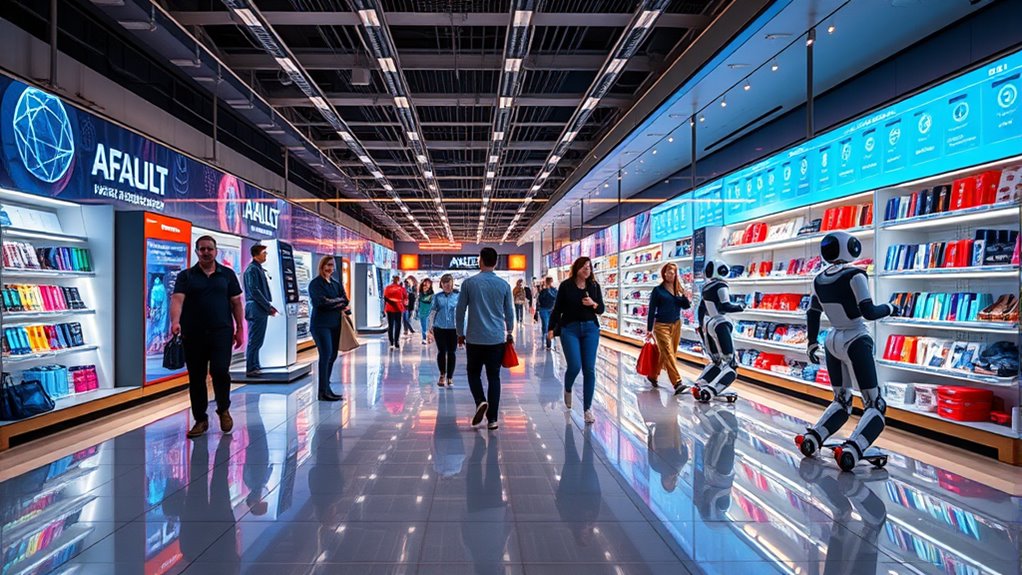Mastering AI is essential if you want to become a future tech leader in retail. Retailers who lead in AI adopt the latest technologies like computer vision, personalized customer experiences, and advanced supply chain analytics. They invest heavily in AI infrastructure and talent, driving higher sales and profits. By embracing AI now, you position yourself at the forefront of industry transformation. Keep exploring to discover how the most successful retailers are shaping tomorrow’s retail landscape.
Key Takeaways
- Mastering AI enhances decision-making, operational efficiency, and customer personalization, positioning retailers as future industry leaders.
- The rapid adoption of AI signifies a fundamental industry transformation, crucial for maintaining competitive advantage.
- Retailers that invest in advanced AI technologies and talent development become pioneers and tech leaders in the retail sector.
- Leveraging AI-driven insights and automation enables retailers to innovate faster and outperform competitors.
- Embracing AI as an integral part of strategy ensures retailers stay relevant and dominate the evolving retail landscape.

Retailers are rapidly adopting AI to stay competitive in a transforming industry. If you want to keep up with evolving customer expectations and rising e-commerce competition, integrating AI into your operations isn’t optional anymore — it’s essential. More than 85% of retail executives have already developed AI capabilities, with 60% actively expanding them. This widespread adoption isn’t limited to a few markets; it’s a global shift, encompassing the U.S., Europe, Brazil, India, and the Middle East. As a result, AI investment now accounts for about 20% of retail technology budgets, up from 15% in 2024. Nearly every retailer has either adopted or evaluated AI solutions, leaving just 1% still on the sidelines. This rapid adoption highlights AI’s role as a core driver of competitive advantage.
Over 85% of retail leaders are adopting AI globally to stay competitive and drive growth.
By leveraging AI, you can profoundly improve decision-making through advanced data capture and analytics. Retailers who harness AI for supply chain management and inventory optimization see tangible benefits—early adopters reduce overstocking by around 18%. AI-driven automation in back-end operations boosts efficiency, helping your business respond faster and operate more smoothly. The financial benefits are clear: retailers using AI report sales 2.3 times higher and profits 2.5 times greater than those without AI. These figures demonstrate that AI isn’t just a tech upgrade; it’s a strategic tool that directly impacts your bottom line. Furthermore, the introduction of Snapdragon 8 Gen 3 enhances processing power, supporting AI functionality in retail applications.
Personalization is another vital area where AI transforms retail. By analyzing customer data, AI algorithms deliver tailored product recommendations that increase customer loyalty—65% of consumers prefer shopping with retailers offering personalized experiences. Meanwhile, 33% of shoppers get frustrated with irrelevant suggestions, emphasizing the importance of refining AI-powered recommendations. Hyper-personalization has become a key part of retail strategies, often driving conversions during peak shopping events like Black Friday. During these periods, AI-powered chatbots have helped boost conversion rates by 15%, showing how AI enhances customer engagement and sales.
The scope of AI in retail continues to expand beyond basic tools. Computer vision improves in-store experiences through smarter cameras and self-checkout stations, while speech-to-text technology enables virtual shopping assistants. These innovations embed AI deeply into daily workflows, from predictive operations to supply chain resilience. Industry forecasts suggest AI solutions will grow at an annual rate of 23%, reflecting a broader industry shift. Furthermore, the integration of AI requires significant investments in technology infrastructure and talent development to maximize benefits.
Ultimately, AI has moved from experimental to indispensable. Retailers prioritize it to meet customer demands quickly, improve service, and streamline operations. This reliance on AI signifies a fundamental industry transformation—those who master it will lead the way into the future. Investing in AI isn’t just about staying current; it’s about becoming tomorrow’s tech leader. Your ability to adapt and leverage AI effectively will determine whether your retail business thrives or falls behind in the competitive landscape.
Frequently Asked Questions
How Does AI Improve Customer Shopping Experiences in Retail?
AI improves your shopping experience by offering hyper-personalized recommendations based on your browsing and purchase history, making it easier to find what you want. It provides virtual try-ons and augmented reality to visualize products, reducing hesitation. AI-driven chatbots and predictive analytics deliver quick, proactive support, ensuring your needs are met seamlessly. By integrating data across channels, AI creates a smooth, tailored journey that boosts your satisfaction and loyalty.
What Are the Biggest Challenges Retailers Face When Implementing AI?
You face several hurdles when implementing AI. You need a clear strategy and organized teams to guide adoption, but often struggle with fragmented efforts and outdated systems. Managing data quality, integrating AI into legacy infrastructure, and ensuring customer trust are major challenges. Additionally, training staff and overcoming resistance slow progress. Addressing privacy concerns and establishing responsible AI practices are essential to successfully unleash AI’s full potential in retail.
How Do Retailers Protect Customer Data With AI Technologies?
You protect customer data with AI by implementing encryption algorithms that secure data in transit and at rest. You use tokenization to replace sensitive info with secure tokens, ensuring privacy while maintaining data utility. Automated data classification and role-based access control limit data exposure, while AI-driven compliance tools help you adhere to regulations like GDPR and PCI DSS. Continuous monitoring and automated incident responses enable quick detection and containment of potential breaches, keeping customer info safe.
What Skills Are Essential for Retail Staff in an Ai-Driven Store?
You need strong communication and customer interaction skills to connect with diverse shoppers and interpret unspoken needs. Technical literacy is vital—understand AI tools like chatbots and virtual assistants, and troubleshoot issues confidently. Product knowledge helps you explain AI-driven recommendations and promotions. Stay adaptable, problem-solve quickly, and continuously learn new AI applications to enhance customer experiences and keep the store running smoothly in an AI-driven environment.
How Does AI Influence Retail Supply Chain Management?
AI transforms your retail supply chain by providing real-time data for better demand forecasting, inventory management, and route optimization. You can quickly identify slow-moving products, reduce waste, and prevent stockouts. AI also predicts risks, helping you respond proactively to disruptions. With smarter decision-making and increased agility, you improve efficiency, lower costs, and enhance customer satisfaction, positioning your business as a leader in an increasingly competitive retail landscape.
Conclusion
By mastering AI, you hold the key to revealing a future where innovation is your guiding star. Just as a lighthouse leads ships through darkness, embracing AI lights your path forward, transforming challenges into opportunities. The true leaders aren’t just riding the wave—they’re shaping the tide. Keep harnessing this powerful tool, and you’ll not only stay afloat but steer your retail empire toward uncharted horizons, becoming the beacon others aspire to follow.









